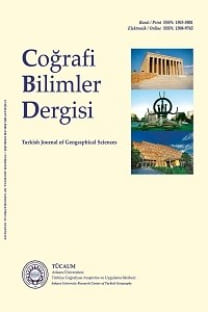Çinaçor Buzulu (Tatos Dağları)
Çinaçor Glaciers (Tatos Mauntains, Rize-Erzurum, Turkey)
Tatos Mountains, Çinaçor, glacier, debris covered glacier Rize-Erzurum/Turkey,
___
- Çiner, A. (2003) "Türkiye'nin güncel buzulları ve Geç Kuvaterner buzul çökelleri", Türk. Jeo. Bül.Cilt:46, Sayı: 1.
- Doğu, A.F.; Somuncu, M.; Çiçek, İ.; Tunçel, H.; Gürgen, G. (1993), "Kaçkar Dağında buzul şekilleri, yaylalar ve turizm" A.Ü. Türkiye Coğrafyası Araştırma ve Uygulama Merkezi Dergisi Sayı:2, s.157-184.
- Doğu, A. F.; Çiçek, İ.; Gürgen, G. ve Tunçel, H. (1996) "Üçdoruk (Verçenik) dağında buzul şekilleri, yaylalar ve turizm", A.Ü, Türkiye Coğ. Araşt. ve Uyg. Merk. Derg. No:5.
- Erinç, S. (1945) Doğu Karadeniz Dağlarında Glasyalmorfoloji Araştırmaları, İst. Üniv.Ed. Fak. Yay. Coğ. Ens. Dok. Tez. Ser. No: 1, İstanbul.
- Erinç S. (1949) "Kaçkardağı Grubunda Diluviyal ve Bu günkü Glasyasyon (Eiszeitliche und gegenwartige Vergletsche-rung in der Kaçkardag-Gruppe)", İst. Üniv. Fen Fak. Mec. Seri. B.C. XIV. S.3, s.243-245.
- Erinç, S. (1952) "The present glaciation in Turkey", General Assembly and 17th International Congress of the International Geographical Union, 8th Proceedings, Washington.
- Gall, H. (1966) Gletscherkundliche Beobachtungen im Hochgebirge von Lasistan (Nordostanatolisches Randgebirge). Mitteilungen der Osterreichischen Geographischen Gesellschaft, 108, Heft II/III.
- Gürgen, G. ve Yeşilyurt, S., (2012) "Karçal Dağı Buzulları (Artvin)", Coğrafi Bilimler Dergisi, 10, 1, 91-104.
- Gürgen, G. (2015) "Verçenik Dağı Buzulları (Rize)" TÜCAUM VIII. Coğrafya Sempozyumu Bildiriler Kitabı, s.73-86.
- Gürgen, G. (2016) "Tatos Gediği Buzulu (Rize)", Coğrafi Bilimler Dergisi, (Baskıda).
- Krenek, L. (1932) "Gletscher im Pontischen Gebirge. (Lasistan)", Zeitschrift f. Gletscherkunde. Bd. 20, S. 129-131, Bildtafel XV u. XVI.
- Kurter, A. (1991) Glaciers of the Middle East and Africa-glaciers of Turkey. (Richard,S.; Williams, R. S.; and Ferrigno, J. G. editors), Satellite image atlas of glaciers of the world. United States Geological Survey Professional Paper 1386-G-1,1-30.
- Koch, K.H.E. (1846) Reise im Pontischen Gebirge.Weimar.
- Sstebnitski, J. (1882) Das Pontische Gebirge, Pett. Mitt.
- Leutelt, R. (1934) "Im Hochgebirge von Lasistan", Osterr Alpenzeitung Wien, Falge 1145, S. 127 - 140.
- Leutelt, R. (1935) "Glazialgeologische Beobachtungen im Lasistanischen", Hochgebirge. z. f, Gletscherkde. 23, S. 67 - 80.
- Loffler, E. (1970) Untersuchungen zum eiszeitlichen und rezenten klimagenetischen Formenschatz in den Gebirgen Nordostanatoliens: Heidelberg Geographische Arbeiten Heft: 27, Heidelberg.
- Yalçınlar, İ. (1951) "Soğanlı-Kaçkar ve Mescit Dağı silsilelerinin glasiasyon şekilleri"İst. Üniv. Coğ. Ens. Der. C.I, S.2, s.82-88.
- ISSN: 1303-5851
- Yayın Aralığı: 2
- Başlangıç: 2003
- Yayıncı: Ankara Üniversitesi Türkiye Coğrafyası Araştırma ve Uygulama Merkezi
Çinaçor Buzulu (Tatos Dağları)
Yağışın mekânsal dağılışında deterministik ve stokastik yöntemler: Mauritius örneği, Doğu Afrika
Olgu AYDIN, Nussaibah Begum RAJA
Batı ve Güneybatı Anadolu'nun Paleocoğrafya ve Jeoarkeolojisinde Santorini (Thera) Küllerinin Önemi
Batı ve Güneybatı Anadolu’nun paleocoğrafya ve jeoarkeolojisinde santorini (thera) küllerinin önemi
